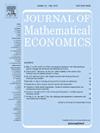收益无限制的动态程序设计近似方法
IF 1
4区 经济学
Q3 ECONOMICS
引用次数: 0
摘要
我们研究的是在价值多重性只归因于无界收益的情况下,具有递归效用的随机动态程序设计。也就是说,我们考虑的 Koopmans 集合器在被人为限制为有界时,满足传统的布莱克韦尔贴现条件(时间加成集合器当然也是如此)。我们认为,去掉截断后,只要存在未截断贝尔曼算子的相关固定点,截断值序列就会收敛到该固定点,否则就会发散。该实验提供了一种自然选择标准,相当于将递归效用从有界收益扩展到无界收益。本文章由计算机程序翻译,如有差异,请以英文原文为准。
An approximation approach to dynamic programming with unbounded returns
We study stochastic dynamic programming with recursive utility in settings where multiplicity of values is only attributed to unbounded returns. That is, we consider Koopmans aggregators that, when artificially restricted to be bounded, satisfy the traditional Blackwell’s discounting condition (as it certainly happens with time-additive aggregators). We argue that, when the truncation is removed, the sequence of truncated values converges to the relevant fixed point of the untruncated Bellman operator, whenever it exists, and diverges otherwise. The experiment provides a natural selection criterion, corresponding to an extension of the recursive utility from bounded to unbounded returns.
求助全文
通过发布文献求助,成功后即可免费获取论文全文。
去求助
来源期刊

Journal of Mathematical Economics
管理科学-数学跨学科应用
CiteScore
1.70
自引率
7.70%
发文量
73
审稿时长
12.5 weeks
期刊介绍:
The primary objective of the Journal is to provide a forum for work in economic theory which expresses economic ideas using formal mathematical reasoning. For work to add to this primary objective, it is not sufficient that the mathematical reasoning be new and correct. The work must have real economic content. The economic ideas must be interesting and important. These ideas may pertain to any field of economics or any school of economic thought.
 求助内容:
求助内容: 应助结果提醒方式:
应助结果提醒方式:


